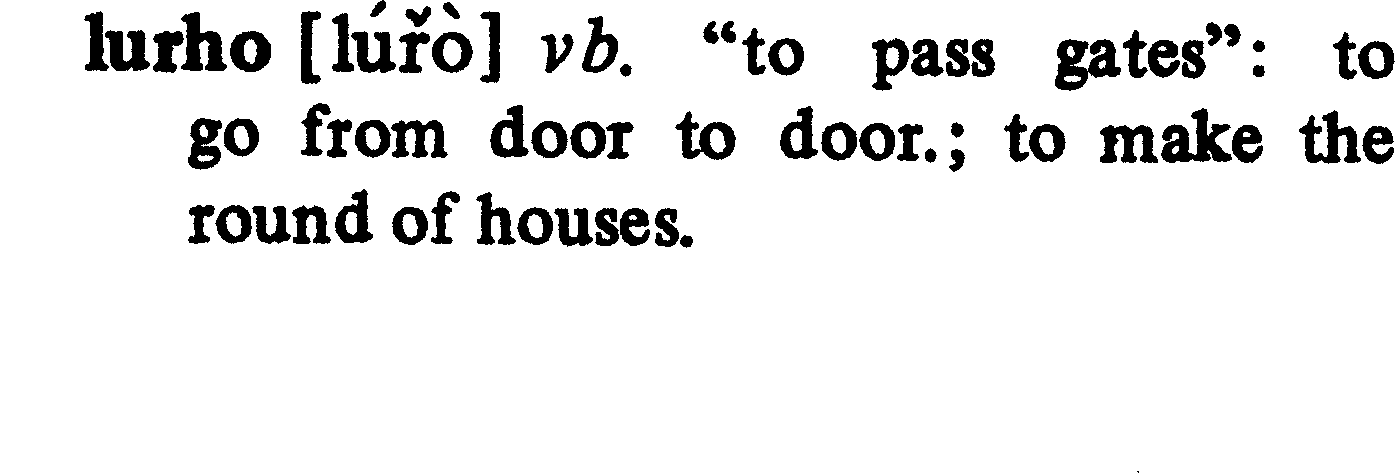la1 [lá] vb. 1. to pass; to take (i.e.
a certain way); to cross. Edinran u
%%

lae ra odọ? ― “Was it this way you
took or the other (way)?”; 2. to
$Page 092$

expire; to be out-dated: Ẹghẹ ọre la
ne; a i ghi ru ẹe: Its time has passed;
it is no longer done.

la2 [lá] vb. to be loud; to resound:
Urhu ẹre la sẹ ọghomwẹn ― “His
voice is louder than mine.”

la3 [lá] vb. 1. to emit pus (e.g. of
an infected ear): Ehọ ọre la: “His
ear is giving off pus”. 2. to produce
water; to run (of a faucet): Ọgba
ne ọ rre owa na i la ― “The tap in
this house does not run.”
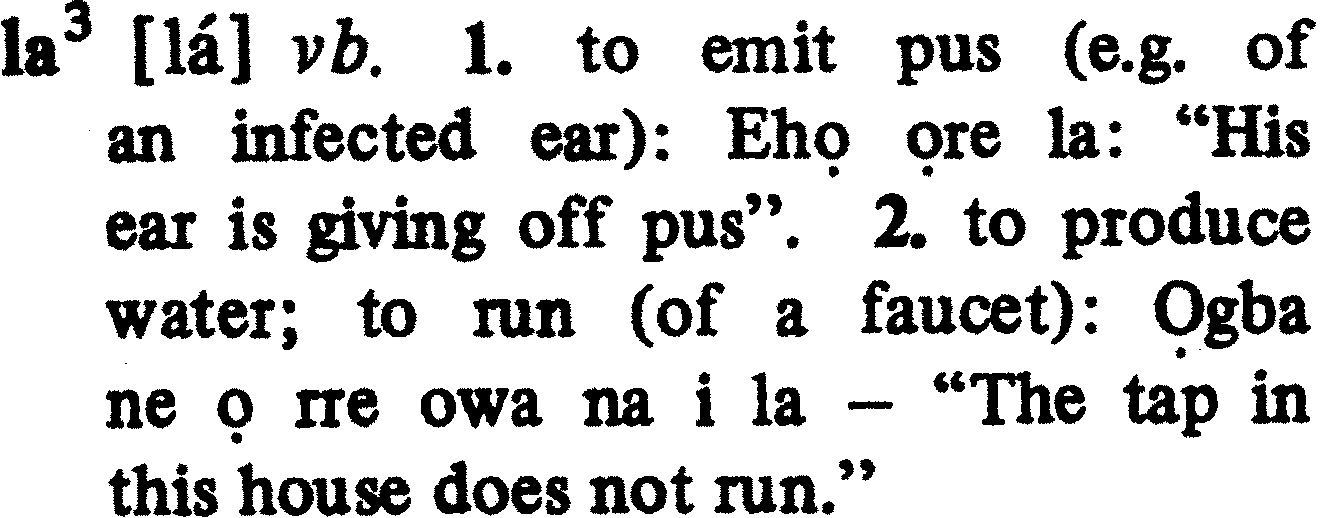
la4 [lá] idiom. (as part of a clan
greeting): the first part of a clan
greeting, such as “Lamogun”; “Laani”
etc., which is used by younger or
junior people to their elders and
superiors as part of the morning
greeting. The greetings may also be
used on other occasions to extend
respect, deference or goodwill.
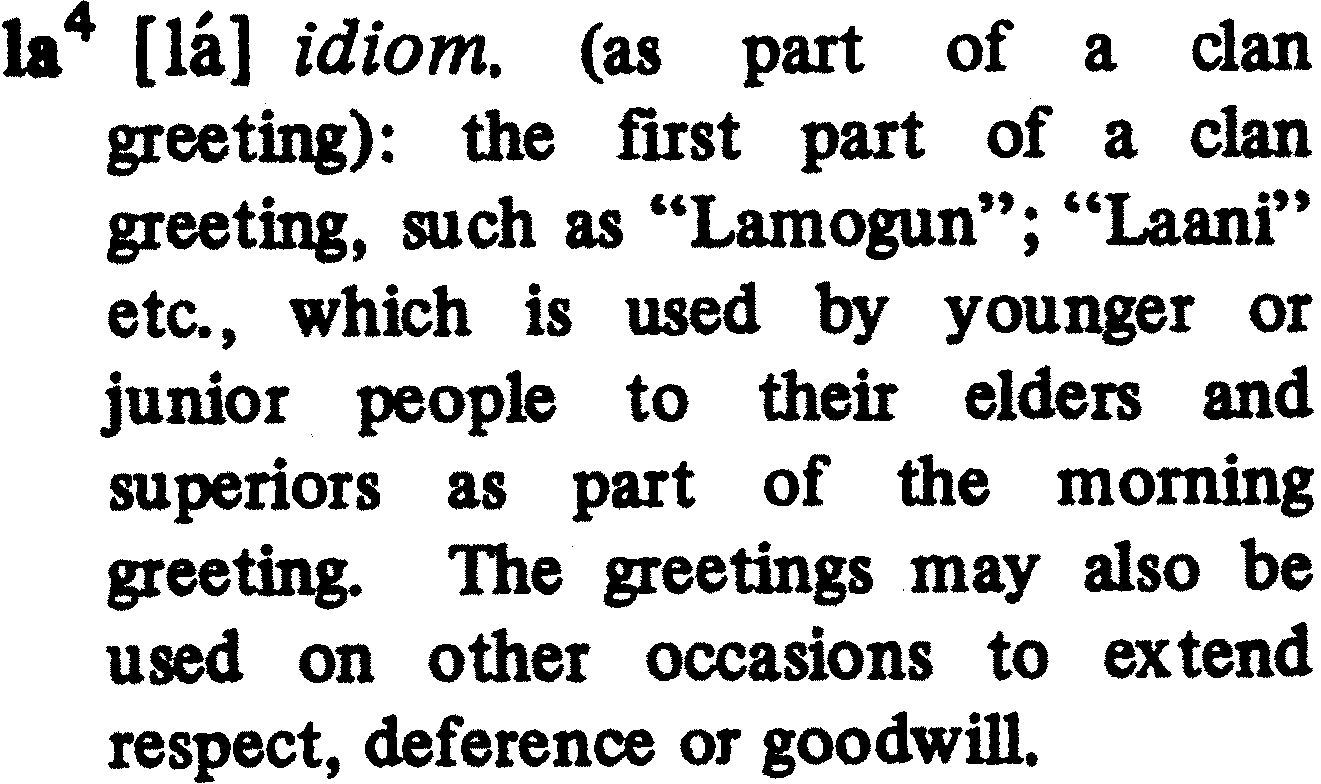
laa [làá] vb. to haul or carry many
things, individually: yaa laa iyan
na laọ owa ― “Go and carry each
of those yams into the house”.

ladian [làdã̀ã́] vb. to come out; to
appear. Ọ ladian vbe iyekowa ― “He
appeared in the backyard”.

lagha [làɣá] vb. to dangle; to hang:
Obọ ovbuẹ lagha fua vbe uwu ukpọn ―
“Your child’s arm is dangling from
the cloth” (i.e. the cloth with which
the child is tied behind his mother.)

laghalagha [làɣàlàɣà] adv.; adj. de-
scribes something that is dangling.
Abọ ọre ne ọ bunrun de rrọọ
laghalagha ― “The branch of it that
was broken hung in a dangling form.”
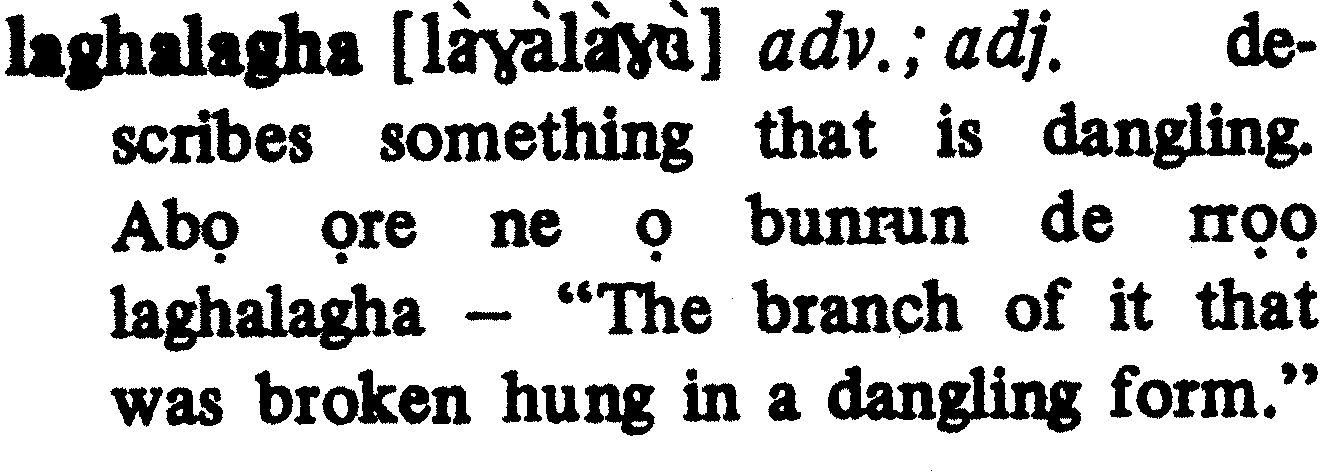
lahọ [làhɔ́] vb. please: Lahọ, mu mẹ ―
“Please, help me to lift the load on
my head.”
%%

lalọ [làlɔ́] vb. to lick: Ọ lalọ uwọnmwẹn
foo nẹ ― “He has finished licking
the soup.”

laọ [làɔ́] vb. 1. to enter (e.g. into a
house): Ọ ma laọ uwowa vbe ọ sẹ
emwan ― “He did not come into
the house when he got here”: (also
lao); 2. prep. occurs after verbs
such as rhie, mu, vio, etc., to mean
“into”: Ọ mu ihẹ ọre laọ owa ―
“He carried his load into the house.”
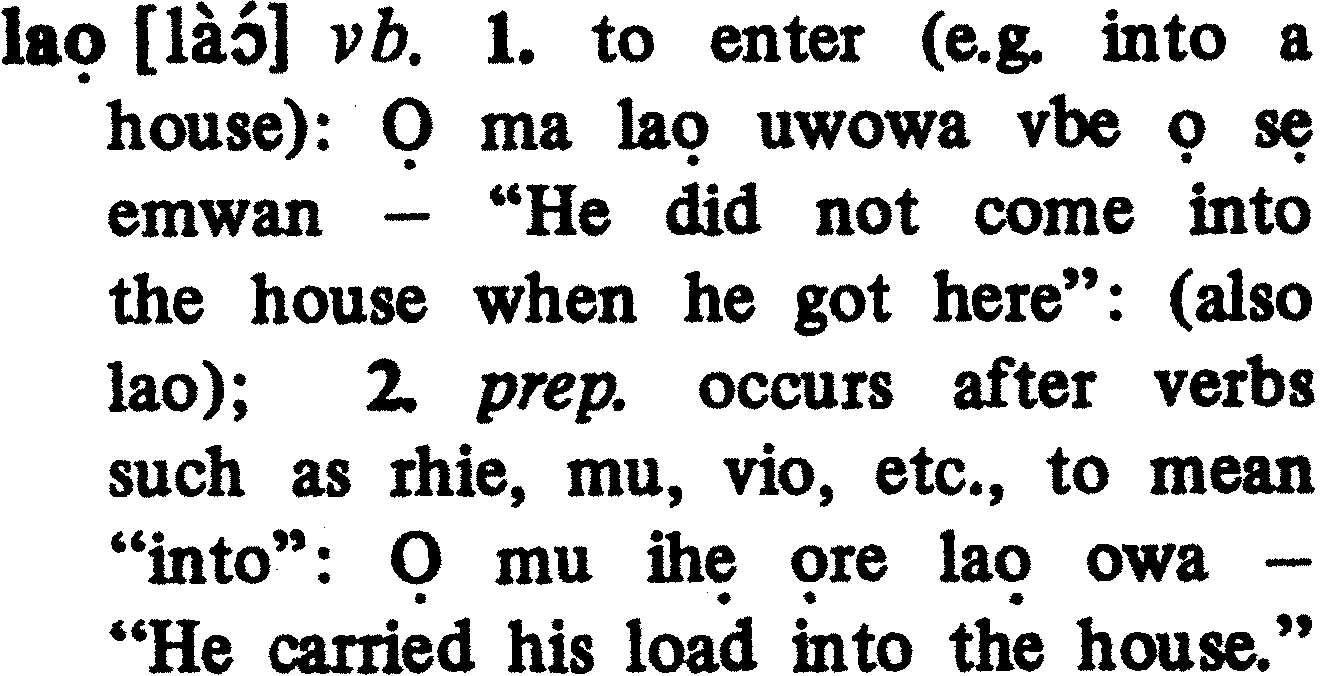
le1 [lé] vb. 1. to cook food; to pre-
pare food: Ọ gua le ere ― “She knows
how to cook beans.”; 2. to immunize
with charms.

le2 [lé] vb. to be very dirty; to be
filthy: Te ughugha ere le ― “His
room is filthy”.

lee [lèé] vb. (used with yan) to insult
somebody with abuses and belittling
gestures: Ọ lee yan rẹn ― “She rained
abuses on him and belittled him
with gestures.” (also leghe).

lele1 [lèlé] vb. 1. to follow; to ac-
company: Ọ lele erhae gha rrie ugbo ―
“He followed his father to the farm.”

lele2 [lèlé] vb. 1. to roam; to wander:
Ọ lele ẹvbo hia khian ― “He is travel-
ling through every country”; 2. to
be everywhere: Utun wa lele ehehia
vbe ugbo na ― “There are mushrooms
everywhere in this farm.”
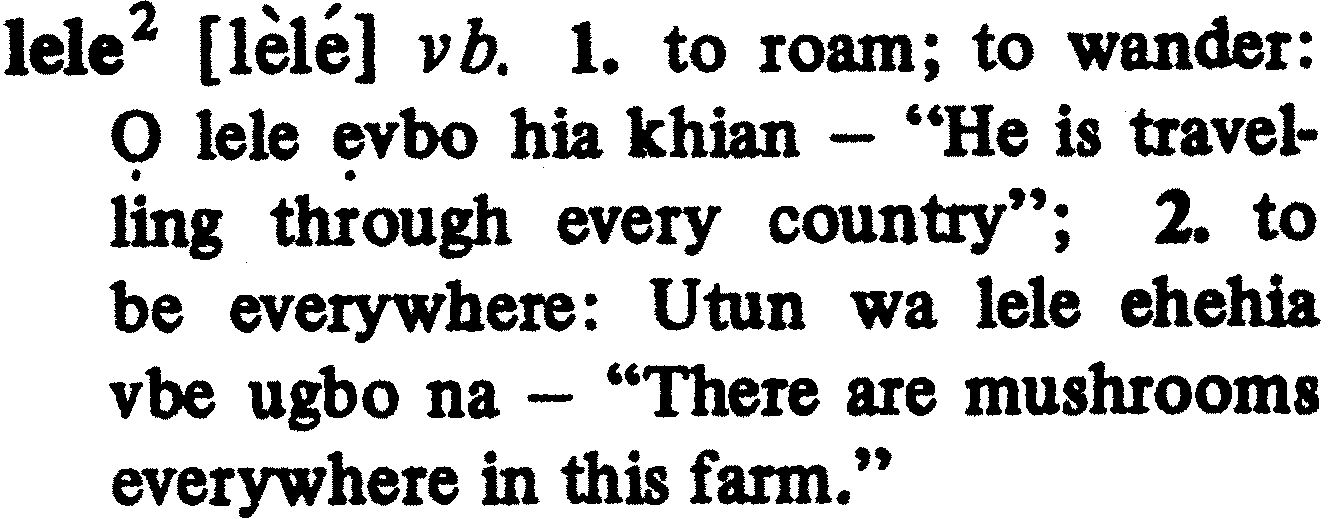
lele3 [lèlé] prep. 1. along; with: Ọ
viẹ lele ẹre dee ― “He is crying along
with him as they approach” (i.e. either
he alone is crying or they are both
crying); 2. after: Ọ rhulẹ lele ẹre
dee ― “She is running after him as
he approaches” (i.e. he is ahead of
her, and not running). If he were
also running with her, then the
meaning of lele in the sentence would
$Page 093$
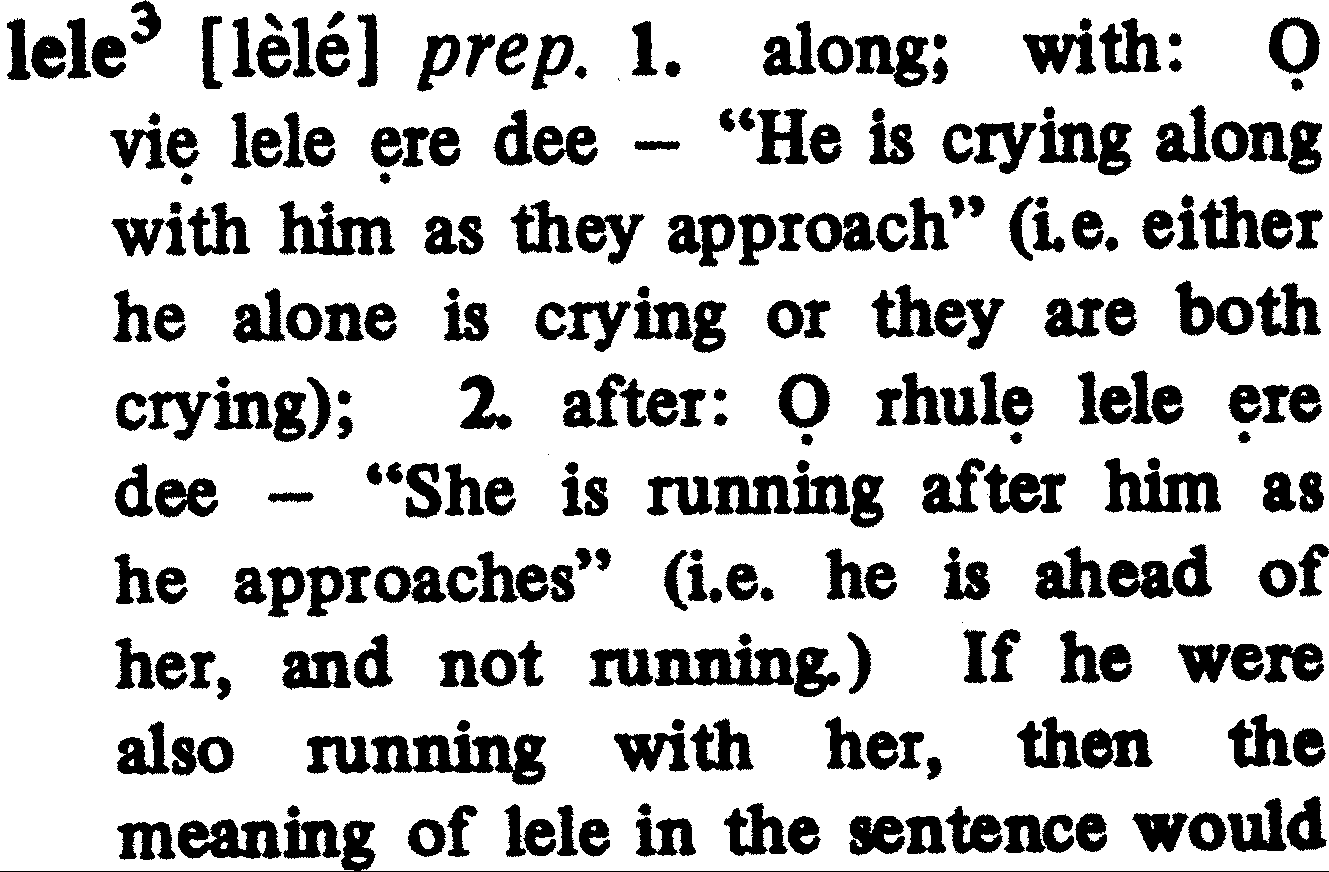
be “along” or “with” rather than
“after”).

lẹẹ1 [lɛ̀ɛ́] vb. to flee; to run away:
Oyi nii lẹẹre ― “That thief fled.”; 2.
(of river) to flow.

lẹẹ2 [lɛ̀ɛ́] vb. to run (off colour); to
wash off colour; to be non-colour-
fast. Ukpọn na lẹẹ ― “This cloth
runs”.

lẹgaa [lɛ̀gàá] vb. to surround; to go
around. 2. as a prep. it means
“around”: Ọ gba ogba legaa owa
re ― “He built a fence around his
house.”

lẹlẹẹlẹ [lɛ́lɛ́ɛ́lɛ́] adj. (with ye) huge;
very big: Ọmọ ne ọ biẹe ye lẹlẹẹlẹ ―
“The baby she gave birth to is very
big.”

lẹre [lɛ̀ɽé] vb. to hide: Ọ lẹre ye
iyeke ẹkhu ― “He hid behind the
door.”

lẹu [lɛ̀u] adv. describes the sound made
by a heavy object when it drops and
hits the ground. Ọ de lẹu ― “It fell
heavily”.

lẹulẹu [lɛ́úlɛ́u] adj. large-sized, huge:
Iran hia ye lẹulẹu ― “They are all
bigger than average size”.

lẹvbo [lɛ́ʋò] vb. (< la ― ẹvbo) “to
pass town”: to roam through town;
to perambulate.

lighi [lìɣí] vb. 1. to tangle (e.g. of a
string); 2. to disrupt; to disturb
peace (e.g. of a gathering): Ọ lighi
iko ne iran do rua ― He disrupted
the meeting that they were holding.

likpalikpa [lìk͡pàlìk͡pà] adj.; adv. de-
scribes a rough surface, or a lumpy
substance: Aro ọre ye likpalikpa ―
%%

“His face is not smooth.”

logho [lòɣó] vb. 1. to be watery (of
a solution): Uwonmwẹn na logho
gbe ― “This soup is too watery: it
is not thick enough.” 2. to be slack;
not tight: Ewu na logho vbe egbe
mwẹn ― “This dress is too slack on
me.”^ (also kpogho). loghologho ―
watery; 3 loose.
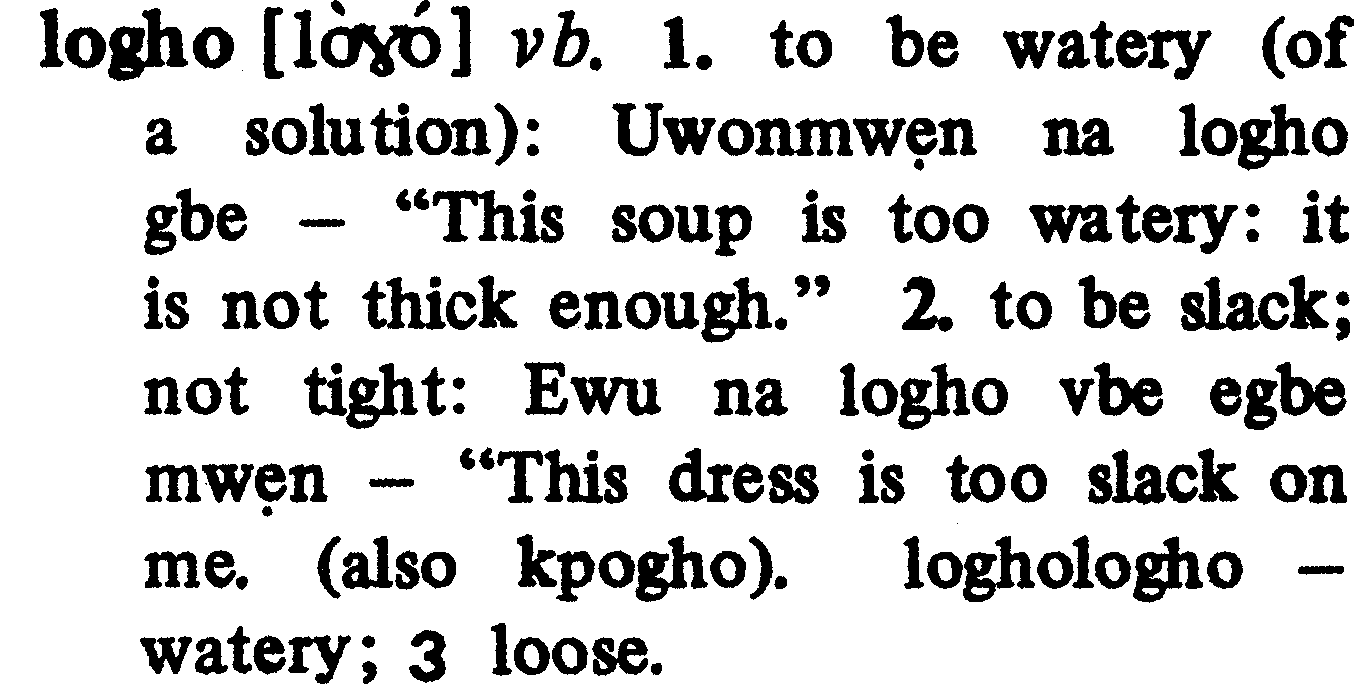
loo [lòó] vb. 1. to use: Erọ mwẹn
ẹre ọ looro ya fiaẹn ― “It was my
knife that he used to cut it.”; 2. to
spend (e.g. time; money; etc.). Uzọla
eva ẹre ọ looro vbe evba nii ― “Two
weeks was what he spent in that
town.”; Ọ loo ígho hia ne ọ guẹe
foo ― “He spent all the money that
he had.”
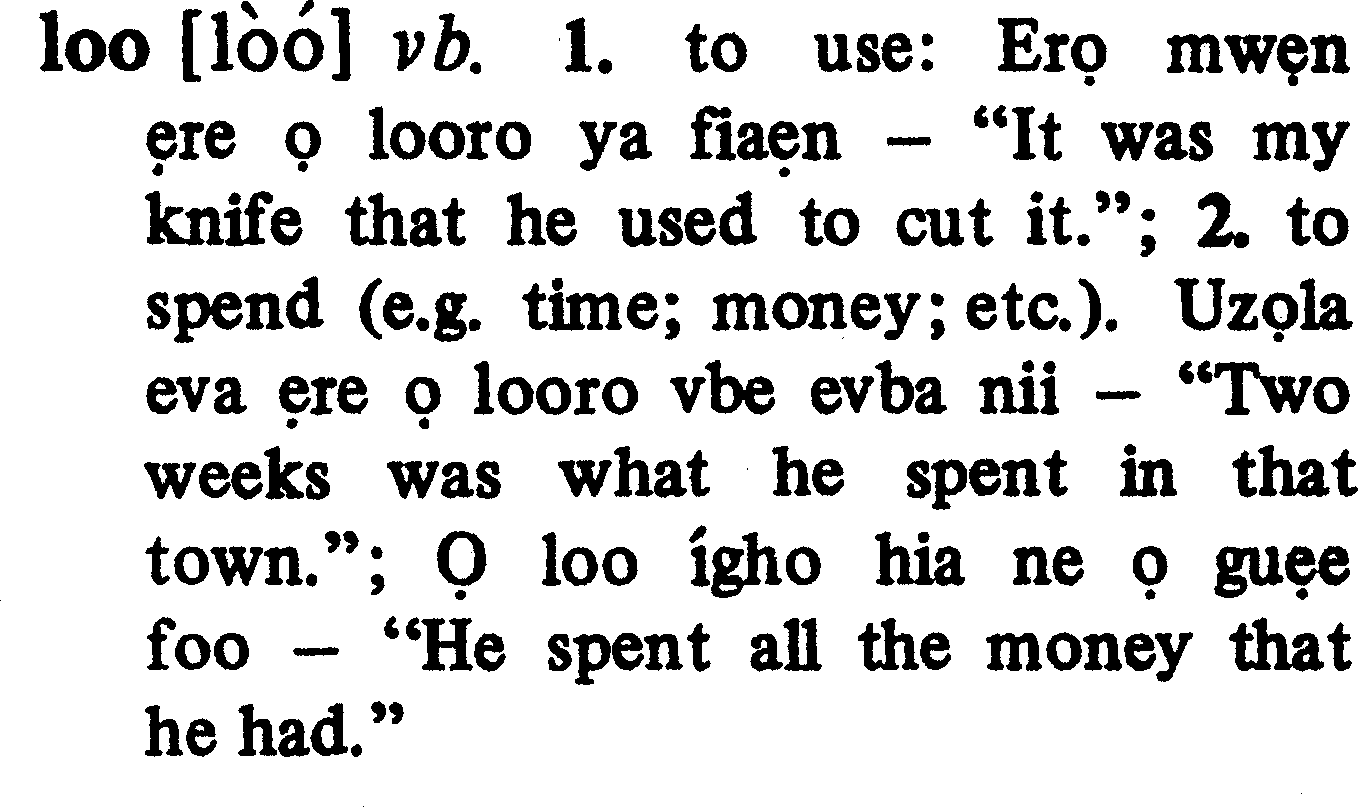
lore [lóé] vb. to roam; to walk about
(also lẹvbo).

lọ [lɔ́] vb. 1. to grind: Ọ lọ ẹhiẹn:
She ground pepper; 2. to sharpen:
lọ erọ na mẹ ― “Sharpen this knife
for me.”; 3. (idiomatic): to be a witch.

lọọ [lɔ̀ɔ́] vb. 1. to press clothes with
an iron: Ọ gha lọọ ewu ne ọ khian
yọ ― “She is pressing the dress that
she will wear.”; 2. to press over or
hit with something heavy: Ọ ya odo
lọọ ọre obọ ― “She pressed over
her hand with the mortar.”
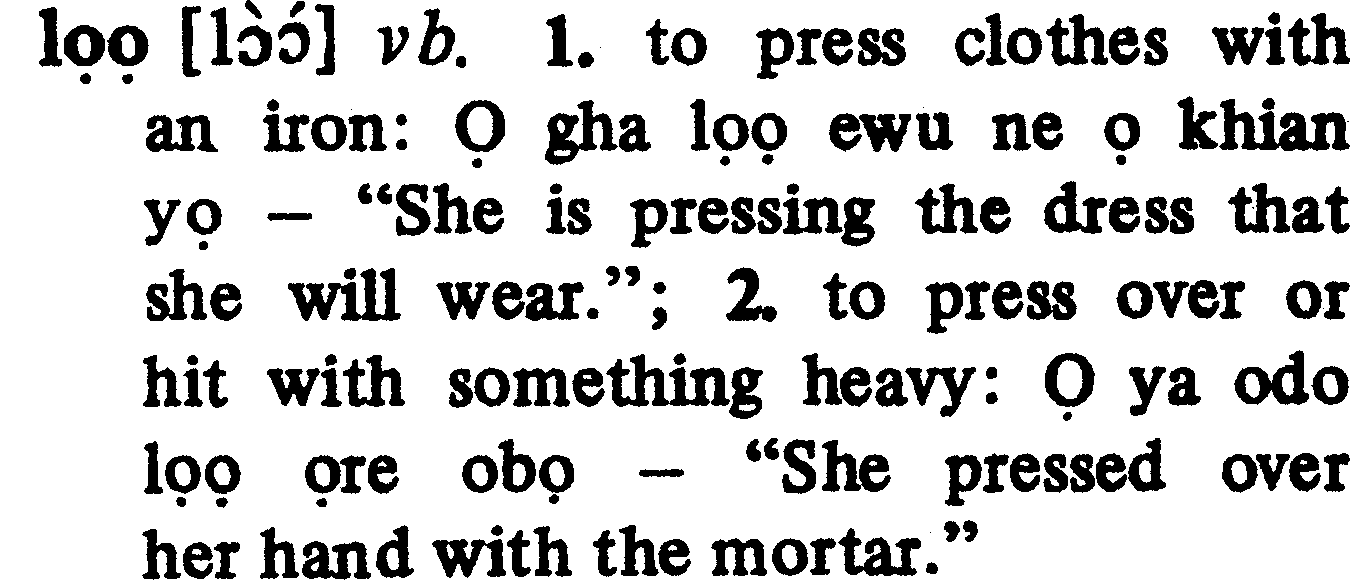
lọghọ1 [lɔ̀ɣɔ́] vb. 1. to be difficult;
to be taxing: Iwinna na lọghọ gbe ―
“This work is very difficult.” 2. to
cause suffering or agony: Uhunmwonva
na waa lọghọ mwẹn ― This sickness
is really causing me a lot of agony.
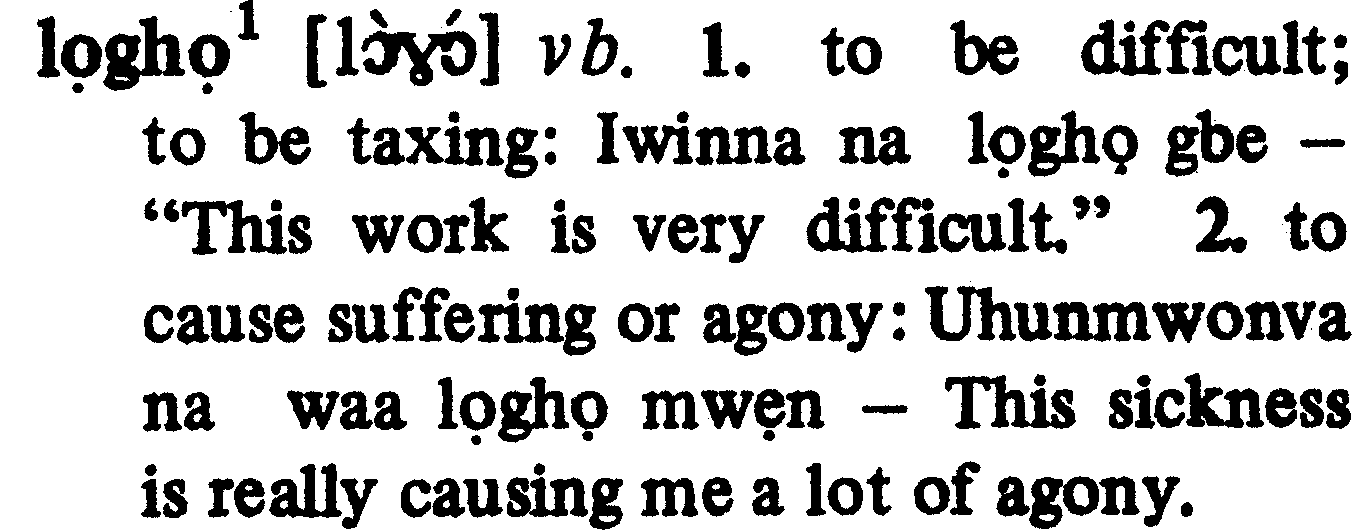
lọghọ2 [lɔ̀ɣɔ́] vb. to dangle (cf. lagha).

lọghọlọghọ [lɔ̀ɣɔ̀lɔ̀ɣɔ̀] adv.; adj. cf.
laghalagha.
$Page 094$

lọlọ [lɔ̀lɔ́] vb. iter. of lọọ2: Ọ ya ekpa
lọlọ ọre arọ ― “He pounded his face
with blows (from his fist).”

lue [lùé] vb. to chew: lue unu ― “to
chew mouth”; “to munch”.

luẹluẹ [lwɛ̀lwɛ́] vb. 1. (of plants) to
wither; 2. to be fatigued.

lughaẹn [lúɣãɛ̃̀] vb. to be different;
to be unique: Ọna ọ lughaẹn vbe uwu
iran ― “This is the unique one among
them.”
%%

lughu [lùɣú] vb. to stir up; to disturb:
Ọ lughu amẹ nii ― “She stirred up
the water”. 2. to be unsettled; to be
turbulent: Ẹko mwẹn lughu ne i
na rhulẹ ― “My stomach became
unsettled because I ran.”
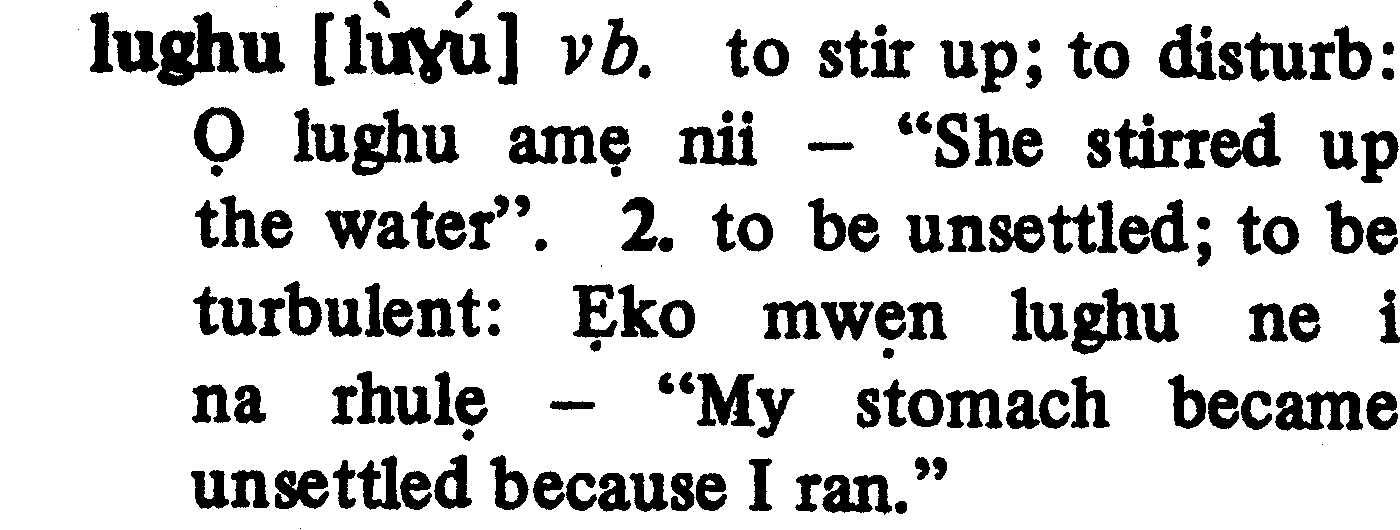
luluulu [lúlúúlú] adj.; adv. cf. lẹlẹẹlẹ.

lurho [lúřò] vb. “to pass gates”: to
go from door to door.; to make the
round of houses.
